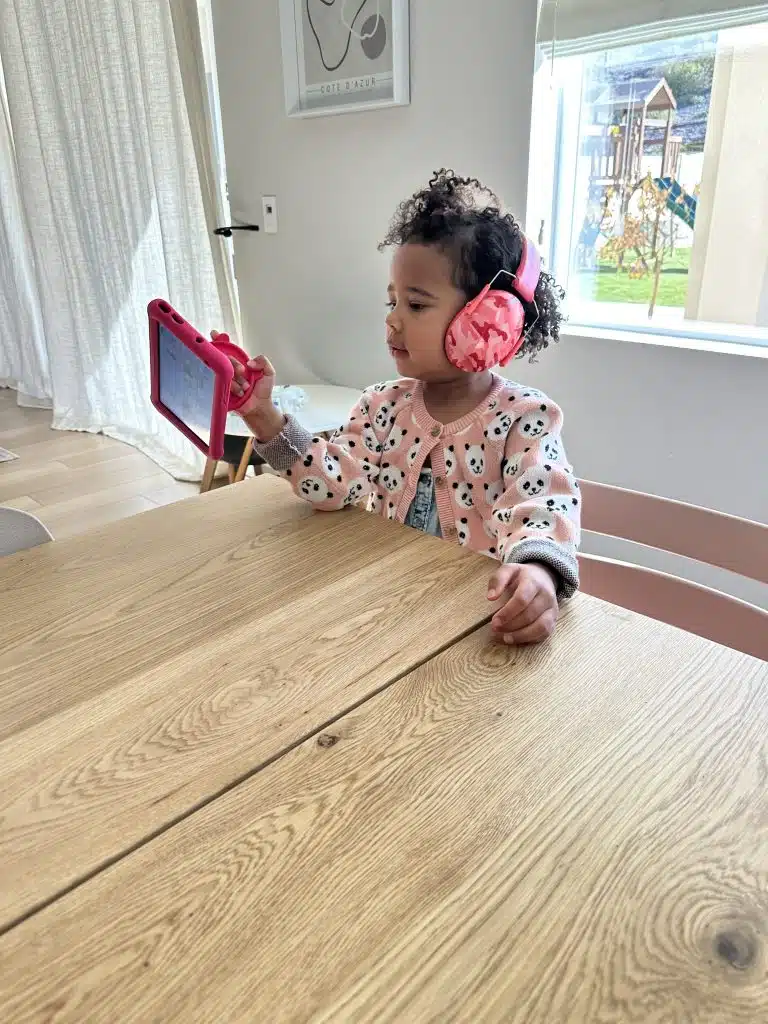Why do kids talk so much? It’s a question that has left many parents scratching their heads. In this blog post, we’ll look into the reasons behind this verbal marathon and how it contributes to your child’s development. We’ll also provide tips on supporting and nurturing your child’s communication skills, particularly for neurodivergent kids and those with thinking and learning differences.
Table of Contents
“Help Your Child Learn to Talk” 👇
Goally’s tablet has some of the top language learning games & apps that help kids learn their first 50 words, practice finger dexterity, fine motor skills, AND communicate with AAC.
Section 1: The Science Behind the Chatter
Brain Development and Language Acquisition
Firstly, it’s important to recognize that talking is a critical aspect of a child’s brain development. As kids grow, their brains are constantly forming new connections, and language acquisition plays a significant role in this process. In other words, the more they talk, the more they learn.
The Importance of Social Interaction
Moreover, talking is a vital tool for social interaction. Kids use language to express their thoughts, feelings, and ideas and to connect with others. For neurodivergent kids and those with thinking and learning differences, talking can be an essential means of navigating social situations and building relationships.

Section 2: The Benefits of Talking
Cognitive and Emotional Growth
Above all, talking promotes cognitive and emotional growth in children. Engaging in conversations helps kids develop critical thinking skills, problem-solving abilities, and emotional intelligence. Additionally, talking allows children to practice and refine their language skills, which can be especially beneficial for kids with unique needs.
Boosting Self-Esteem and Confidence
Furthermore, talking can boost a child’s self-esteem and confidence. As they share their thoughts and ideas, kids gain a sense of accomplishment and validation. This is particularly important for neurodivergent kids, who may struggle with self-expression and communication.
Section 3: Supporting Your Child’s Communication Skills
Encourage Conversations
To support your child’s communication skills, encourage conversations by asking open-ended questions and showing genuine interest in their thoughts and opinions. This not only helps your child feel valued but also promotes active listening and empathy.

Create a Language-Rich Environment
In addition, create a language-rich environment by exposing your child to various forms of communication, such as books, music, and storytelling. This will help expand their vocabulary and enhance their understanding of different communication styles. Goally’s learning tablet for kids can be a great tool to provide engaging content that supports language development.
Section 4: Tips for Managing Excessive Talking
Set Boundaries and Expectations
While talking is essential for a child’s development, it’s also crucial to set boundaries and expectations. For instance, establish rules for when it’s appropriate to talk and when it’s time to listen. This will help your child develop essential social skills and respect for others.
Teach Conversation Etiquette
Similarly, teach your child conversation etiquette, such as taking turns, not interrupting, and maintaining eye contact. These skills will not only benefit your child in social situations but also contribute to their overall communication abilities.
Section 5: Embracing Your Child’s Chatter
Celebrate Their Uniqueness
In short, it’s essential to embrace your child’s chatter and celebrate their uniqueness. Remember that talking is a natural part of their development and an opportunity for growth and learning. By supporting and nurturing their communication skills, you’re helping your child build a strong foundation for future success.

“I found Goally on Instagram a few months ago and I thought, this sounds like a perfect aid for Ivy. Ivy had just started speaking, but her communication was still very minimal. Goally’s visual schedule and AAC-inspired Talker had me really interested. While we want and believe Ivy will find her voice and spoken language, we also believe that communication comes in many forms. Goally has helped us offer our daughter a voice while she learns to find her own. The key is to support communication in whatever form that takes.” – Cassidy I.
Be Patient and Supportive
Lastly, be patient and supportive as your child navigates the world of language and communication. Understand that every child is different, and their talking habits may vary. By providing a loving and encouraging environment, you’ll help your child flourish and develop into a confident, articulate individual. Goally’s apps for kids can be a valuable resource in supporting your child’s communication journey.
This post was originally published on 05/19/2023. It was updated on 07/17/2023.

Goally
We help parents teach their kids life skills, like doing bedtime and morning independently. Backed by science, we incorporate evidence-based practices and expert-informed designs in all of our apps and content.





